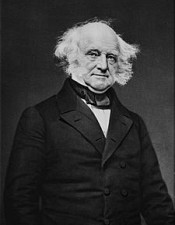Van Buren Martin

Martin Van Buren (pronounced /væn ˈbjʊərɨn/ or /væn ˈbjɜrɨn/; December 5, 1782 – July 24, 1862) was the eighth President of the United States from 1837 to 1841. Before his presidency, he served as the eighth Vice President (1833–1837) and the 10th Secretary of State under Andrew Jackson. He was a key organizer of the Democratic Party, a dominant figure in the Second Party System, and the first president who was not of British (i.e. English, Welsh, Scottish, or Irish) descent—his ancestry was Dutch. He was the first president to be born an American citizen[2] (his predecessors were born British subjects before the American Revolution), and is also the only president not to have spoken English as a first language, having grown up speaking Dutch.[3] Moreover, he was the first president from New York. Van Buren was the third president to serve only one term, after John Adams and his son, John Quincy Adams. He also was one of the central figures in developing modern political organizations. As Andrew Jackson's Secretary of State and then Vice President, he was a key figure in building the organizational structure for Jacksonian democracy, particularly in New York State. However, as a president, his administration was largely characterized by the economic hardship of his time, the Panic of 1837. Between the bloodless Aroostook War and the Caroline Affair, relations with Britain and its colonies in Canada also proved to be strained. Whether these were directly his fault, Van Buren was voted out of office after four years, with a close popular vote but a rout in the electoral vote. In 1848, he ran for president on a third-party ticket, the Free Soil Party. Martin Van Buren is one of only two people, the other being Thomas Jefferson, to serve as Secretary of State, Vice President and President.[4][5][6] Martin Van Buren was born in the village of Kinderhook, New York, on December 5, 1782, approximately 25 miles south of Albany. His father, Abraham Van Buren (1737–1817) was a farmer, the owner of a handful of slaves, and a tavern-keeper in Kinderhook. Abraham Van Buren supported the American Revolution and later the Jeffersonian Republicans. He died while Martin Van Buren was a New York state senator. Martin Van Buren's mother, Maria Hoes Van Alen Van Buren (1747–1818), was of Dutch ancestry. Her first husband, Johannes Van Alen, died and left her with three children. In 1776, she married Abraham Van Buren. She never got over the loss of her second husband in 1817 and died less than a year after burying him. By his mother's first marriage, Van Buren had one half-sister and two half-brothers, including James Van Alen, who practiced law with Van Buren for a time and served as a Federalist member of Congress (1807–1809). Van Buren had four full siblings from his parents' marriage: Dirckie "Derike" Van Buren (1777–1865), Jannetje "Hannah" Van Buren (born 1780), Lawrence Van Buren (1786–1868), who served as an officer in the New York militia during the War of 1812 and later was active in the Barnburners New York Democrats opposed to slavery, and Abraham Van Buren (1788–1836). Van Buren was the first president born a citizen of the United States, as all previous presidents were born before the American Revolution. His great-great-great-great-grandfather Cornelis had come to the New World in 1631 from the Netherlands. Van Buren received a basic education at a dreary, poorly lit schoolhouse in his native village and later studied Latin briefly at the Kinderhook Academy. He excelled in composition and speaking. His formal education ended before he reached 14, when he began studying law at the office of Francis Sylvester, a prominent Federalist attorney in Kinderhook. After six years under Sylvester, he spent a final year of apprenticeship in the New York City office of William P. Van Ness, a political lieutenant of Aaron Burr. Van Buren was admitted to the bar in 1803. Van Buren married Hannah Hoes, his childhood sweetheart and distant relative on February 21, 1807, in Catskill, New York. Like Van Buren, she was raised in a Dutch home and never lost her distinct Dutch accent. After about 10 years of marriage, Hannah Van Buren contracted tuberculosis and died on February 5, 1819, at the age of 35. Martin Van Buren never remarried. Martin and Hannah Van Buren had four sons: Van Buren had been active in politics from at least the age of 17 when he attended a party convention in Troy, New York where he worked to secure the Congressional nomination for John Van Ness. However, once established in his practice, he became wealthy enough to increase his focus on politics. He was an early supporter of Aaron Burr. He allied himself with the Clintonian faction of the Democratic-Republican Party, and was surrogate of Columbia County from 1808 until 1813, when he was removed. In 1812, he became a member of the New York State Senate. As a member of the state Senate, Van Buren supported the War of 1812 and drew up a classification act for the enrollment of volunteers. He broke with DeWitt Clinton in 1813 and tried to find a way to oppose Clinton's plan for the Erie Canal in 1817. Van Buren supported a bill that raised money for the canal through state bonds, and the bill quickly passed through the legislature with the help of his Tammany Hall compatriots. In 1817 Van Buren's connection with so-called "machine politics" started. He created the first political machine encompassing all of New York, the Bucktails, whose leaders later became known as the Albany Regency. The Bucktails became a loyal faction with a great deal of party loyalty, and through their actions they were able to capture and control many patronage posts throughout New York. Van Buren did not originate the system, but gained the nickname of "Little Magician" for the skill with which he exploited it. He also served as a member of the state constitutional convention, where he opposed the grant of universal suffrage and tried to maintain property requirements for voting. He was the leading figure in the Albany Regency, a group of politicians who for more than a generation dominated much of the politics of New York and powerfully influenced the politics of the nation. The group, together with the political clubs such as Tammany Hall that were developing at the same time, played a major role in the development of the "spoils system," a recognized procedure in national, state and local affairs. He was the prime architect of the first nationwide political party: the Jacksonian Democrats. In Van Buren's own words, "Without strong national political organizations, there would be nothing to moderate the prejudices between free and slaveholding states." ("Martin Van Buren" 103–114) Although he himself was a slave owner, Van Buren's attitude towards slavery at the time was shown by his vote, in January 1820, for a resolution opposing the admission of Missouri as a slave state. In the same year, he was chosen a presidential elector. In February 1821, Martin Van Buren was elected a U.S. Senator from New York, defeating the incumbent Nathan Sanford who ran as the Clintonian candidate. Martin Van Buren at first favored internal improvements, such as road repairs and canal creation, therefore proposing a constitutional amendment in 1824 to authorize such undertakings. The next year, however, he took ground against them. He voted for the tariff of 1824 then gradually abandoned the protectionist position, coming out for "tariffs for revenue only." In the presidential election of 1824, Martin Van Buren supported William H. Crawford and received the electoral vote of Georgia for vice-president, but he shrewdly kept out of the acrimonious controversy which followed the choice of John Quincy Adams as President. Martin Van Buren had originally hoped to block Adams' victory by denying him the state of New York (the state was divided between Martin Van Buren supporters who would vote for William H. Crawford and Adams men). However, Representative Stephen Van Rensselaer swung New York to Adams and thereby the 1824 Presidency. He recognized early the potential of Andrew Jackson as a presidential candidate. After the election, Martin Van Buren sought to bring the Crawford and Jackson followers together and strengthened his control as a leader in the Senate. Always notably courteous in his treatment of opponents, he showed no bitterness toward either John Quincy Adams or Henry Clay, and he voted for Clay's confirmation as Secretary of State, notwithstanding Jackson's "corrupt bargain" charge. At the same time, he opposed the Adams-Clay plans for internal improvements and declined to support the proposal for a Panama Congress. As chair of the Judiciary Committee, he brought forward a number of measures for the improvement of judicial procedure and, in May 1826, joined with Senator Thomas Hart Benton in reporting on executive patronage. In the debate on the "tariff of abominations" in 1828, he took no part but voted for the measure in obedience to instructions from the New York legislature, an action which was cited against him as late as during the presidential campaign of 1844. Martin Van Buren was not an orator, but his more important speeches show careful preparation and his opinions carried weight; the oft-repeated charge that he refrained from declaring himself on crucial questions is hardly borne out by an examination of his senatorial career. In February 1827, he was reelected to the Senate by a large majority. He became one of the recognized managers of the Jackson campaign, and his tour of Virginia, the Carolinas, and Georgia in the spring of 1827 won support for Jackson from Crawford. Martin Van Buren sought to reorganize and unify "the old Republican party" behind Jackson.[7] Van Buren helped create a popular style of politicking that is often seen today. At the state level, Jackson's committee chairs would split up the responsibilities around the state and organize volunteers at the local level. "Hurra Boys" would plant hickory trees (in honor of Jackson's nickname, "Old Hickory") or hand out hickory sticks at rallies. Martin Van Buren even had a New York journalist write a campaign piece portraying Jackson as a humble, pious man. "Organization is the secret of victory," an editor in the Adams camp wrote. He once said to a group of lobbyists the famous quote and "By the want of it we have been overthrown." In 1828, Van Buren was elected Governor of New York for the term beginning on January 1, 1829, and resigned his seat in the Senate.
do you like this author?
What readers are saying
What do you think? Write your own comment on this book!
write a commentWhat readers are saying
What do you think? Write your own comment on this author!
write a commentBook list

the votes and speeches of martin van buren on the subjects of the right of suff
Series:
Unknown
Year:
Unknown
Raiting:
5/5
Show more
add to favoritesadd In favorites

speech of the hon m van buren of the senate on the act to carry into effect
Series:
Unknown
Year:
Unknown
Raiting:
5/5
Show more
add to favoritesadd In favorites

speech of mr van buren of new york delivered in the senate of the united stat
Series:
Unknown
Year:
Unknown
Raiting:
3.5/5
Show more
add to favoritesadd In favorites
Book list

the votes and speeches of martin van buren on the subjects of the right of suff
Series:
Unknown
Year:
Unknown
Raiting:
5/5
Show more
add to favoritesadd In favorites

speech of the hon m van buren of the senate on the act to carry into effect
Series:
Unknown
Year:
Unknown
Raiting:
5/5
Show more
add to favoritesadd In favorites

speech of mr van buren of new york delivered in the senate of the united stat
Series:
Unknown
Year:
Unknown
Raiting:
3.5/5
Show more
add to favoritesadd In favorites

inquiry into the origin and course of political parties in the united states
Series:
Unknown
Year:
Unknown
Raiting:
3/5
This volume is produced from digital images created through the University of Michigan University Library's preservation reformatting program. The Library seeks to preserve the intellectual content of items in a manner that facilitates and promotes a variety of uses. The digital reformatting process results in an electronic version of the text that can both be accessed online and used to create new print copies. This book and thousands of others can be found in the digital collections of the University of Michigan Library. The University Library also understands and values the utility of print, and makes reprints available through its Scholarly Publishing Office.
Show more
add to favoritesadd In favorites

State of the Union Address
Series:
Unknown
Year:
Unknown
Raiting:
3/5
I regret that I can not on this occasion congratulate you that the past year has been one of unalloyed prosperity. The ravages of fire and disease have painfully afflicted otherwise flourishing portions of our country, and serious embarrassments yet derange the trade of many of our cities. But notwithstanding these adverse circumstances, that general prosperity which has been heretofore so bountifully bestowed upon us by the Author of All Good still continues to call for our warmest gratitude. Especially have we reason to rejoice in the exuberant harvests which have lavishly recompensed well-directed industry and given to it that sure reward which is vainly sought in visionary speculations. I cannot, indeed, view without peculiar satisfaction the evidences afforded by the past season of the benefits that spring from the steady devotion of the husbandman to his honorable pursuit.
Show more
add to favoritesadd In favorites
What readers are saying
What do you think? Write your own comment on this author!
write a commentif you like Van Buren Martin try:
readers also enjoyed
What readers are saying
What do you think? Write your own comment on this author!
write a commentGenre
if you like Van Buren Martin try:
readers also enjoyed
Do you want to read a book that interests you? It’s EASY!
Create an account and send a request for reading to other users on the Webpage of the book!

